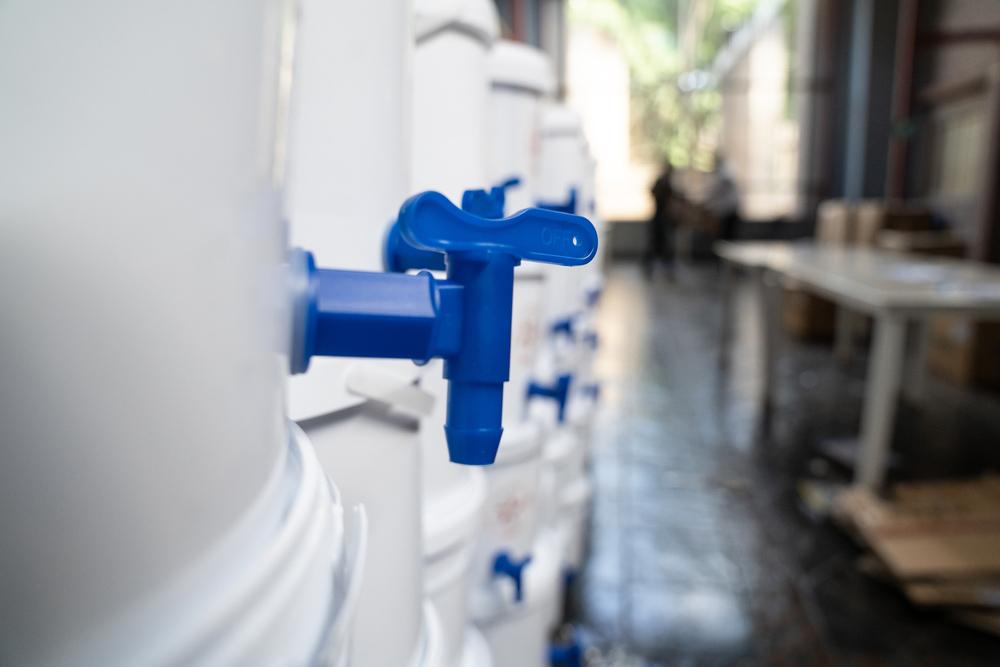Southern Africa: Background of cholera outbreaks
What is cholera?
Cholera is a disease caused by eating or drinking something that is contaminated with cholera bacteria. People with cholera develop profuse diarrhoea and (sometimes also vomiting), which leads to dehydration. They can die very quickly, sometimes within 24 hours. Because the cholera bacteria live in water, epidemics can spread very fast if people have no access to clean water.
What is happening in Southern Africa?
All countries where MSF is working in Southern Africa have been affected by cholera in 2023. Since the beginning of this year, MSF has done cholera interventions in Zimbabwe (Harare, Beitbridge, Chegutu), Mozambique (Quelimane, Macomia), Malawi (Mangochi, Lilongwe, Blantyre) and South Africa (Hammanskraal).
Cholera is not a new disease in Southern Africa. In countries like Malawi, Zimbabwe and Mozambique, cholera is endemic. This means that a certain number of cholera cases is to be expected, because cholera bacteria are present and the environmental conditions facilitate their spread.
In 2022 there was already a worldwide surge in the number of cholera cases, so the situation is not unique to Southern Africa. This trend from 2022 has extended to 2023. But cholera outbreaks have occurred not only in the endemic countries (Malawi, Mozambique, Zimbabwe) but also in South Africa, which was unexpected and worrying. And the large-scale outbreaks in Malawi and Mozambique are not part of the usual endemic pattern.
The lack of access to safe drinking water and sewage treatment in several places in the affected countries certainly plays a role. Also important are extreme weather events. Cyclone Freddy, that hit (among other countries) Mozambique and Malawi, contributed to a peak in cholera cases. The cyclone destroyed infrastructure and caused severe floodings, which destroyed access to safe drinking water and made the cholera bacteria spread very fast.
On top of this, there is a chronic lack of cholera vaccines since 2022. Cholera vaccines are not only used to stop cholera epidemics, but also to prevent them. However, because of the shortage of vaccines, authorities are reluctant to vaccinate preventively, to make sure there are enough doses left to vaccinate in case of an outbreak. The shortage not only hampers ending cholera epidemics, but also allows more outbreaks to start in the first place.

What can be done about it?
Unfortunately, it doesn’t look like cholera is going to go away any time soon. Areas with a lot of poverty and a lack of good water infrastructure are always vulnerable to the disease. Global warming means more cyclones and flooding for this part of the world, and we know that further increases the risk of cholera outbreaks.
The first thing that needs to happen is an increased availability of vaccines. The current scarcity is a problem and because we expect more outbreaks, the problem will only become bigger. More vaccines are an absolute must.
Given the importance of clean water, governments and other organisations will also have to invest in solid infrastructure for drinking water and waste management. This is the only long-term solution for cholera, and given the increased risk by climate change, investments need to be sped up.
In the meanwhile, as outbreaks keep occurring, it’s important to organise health promotion campaigns, and to train medical staff to treat cholera. Cholera can kill quickly, so fast and adequate medical interventions are crucial. If we can’t avoid people getting sick from cholera, we must at least avoid them dying from it.
20230620 Cholera SnA article.docx
DOCX 27 KB

About Doctors Without Borders (MSF)
Doctors Without Borders (MSF) is a global network of principled medical and other professionals who specialise in medical humanitarian work, driven by our common humanity and guided by medical ethics. We strive to bring emergency medical care to people caught in conflicts, crises, and disasters in more than 70 countries worldwide.
In South Africa, the organisation is recognised as one of the pioneers of providing Antiretroviral Treatment (ART) in the public sector and started the first HIV programmes in South Africa in 1999. Until today, the focus of MSF’s interventions in the country has primarily been on developing new testing and treatment strategies for HIV/AIDS and TB in Eshowe (Kwa-Zulu Natal) and Khayelitsha (Western Cape).
In Tshwane, we run a migration project, and we offer medical and psychosocial care to migrants, refugees, and asylum seekers, who struggle to access public health services under South Africa’s increasingly restrictive.
Previously we offered free, high-quality, confidential medical care to survivors of SGBV in Rustenburg.
To learn more about our work in South Africa, please visit this page on our website (www.msf.org.za). To support MSF’s work:
- SMS “JOIN” to 42110 to donate R30 Once-off
- Visit https://www.msf.org.za/donate